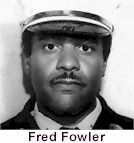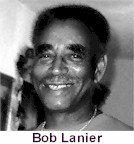LAKELAND — The Sept. 11 terrorist attacks on the World Trade
Center and Pentagon impacted untold numbers of people throughout the
world, but affected three Florida Conference United Methodists more
personally. Two are former New York City firefighters; one is a
chaplain from the Florida Conference.
Fred Fowler and Bob Lanier served the Fire Department New York (FDNY)
before retiring as captains and moving with their wives to Palm Coast.
Both attend First United Methodist Church of Palm Coast and are part
of a group of 19 retired New York firefighters who live in Palm Coast
and usually meet monthly for fellowship and reflection on old times.
For Fowler and his wife Faye, the attacks hit too close to home.
Their son, Rick, was one of the firefighters who arrived on the scene
as the second World Trade Center tower was collapsing. He escaped
unharmed, but Faye’s second cousin and one of Rick’s colleagues,
Vernon Cherry, is missing.
"Firefighting families — it’s something we live with every
day," Faye Fowler told the "Review." "We don’t
dwell on it. Right now, especially his mother and his wife, they are
still hoping. The rest of us are getting resigned."
 Fred
Fowler, who retired in 1993, drove to New York the Sunday after the
attacks to see his son, who works for the same hook and ladder company
that employed the elder Fowler. Fred arrived at the firehouse, finding
Rick Fowler, like the others, on continuous duty.
Fred
Fowler, who retired in 1993, drove to New York the Sunday after the
attacks to see his son, who works for the same hook and ladder company
that employed the elder Fowler. Fred arrived at the firehouse, finding
Rick Fowler, like the others, on continuous duty.
"He was pretty much himself," Fowler said. "All of
the fellows were pretty much themselves. I think that while they’re
on duty they operate as normally as can be expected. It seems to be
better for them when they’re in the firehouse and they’re not home
reflecting.
"The community, the neighborhood, really turned out for them.
They had a lot of food and flowers, cards and candles."
Rick Fowler was off-duty when the towers were hit by the planes and
was called in to work. When he arrived at the firehouse the companies
had already responded. He and a few other firefighters drove in a
private car to the scene, discovering that one tower had already
collapsed and the other was near collapse. The firefighters scrambled
for cover; Rick found shelter under a fire engine.
"He [Rick] said when he got under there you could hear it
rumbling. It wasn’t like an instantaneous thing. The noise was
horrendous, and it felt like it was taking minutes. He just kept
hearing that roar, and dust engulfed them. He put his face in his
coat, because that was the only place he could breathe. They all just
went blind because of the dust getting in their eyes," Fowler
said.
The entire crew of eight men that had been first to arrive on the
scene, including Cherry, were all missing as of press time for this
article. Among the eight is Rick Fowler’s best friend and co-worker,
Leon.
"Just by the grace of God, he [Rick] missed it," Fowler
said.
 Bob
Lanier knew more than 40 of the firefighters who are missing and
presumed dead from the World Trade Center attacks, including two fire
chiefs with whom he worked before retiring in 1989 after 31 years with
the FDNY.
Bob
Lanier knew more than 40 of the firefighters who are missing and
presumed dead from the World Trade Center attacks, including two fire
chiefs with whom he worked before retiring in 1989 after 31 years with
the FDNY.
"I just can’t believe. I still can’t believe," Lanier
said. "One of the fellows [missing], I remember the first day he
walked into the firehouse. His wife had just had twin babies. He
served under me for five years. I knew the whole family. He was just
one of the nicest guys."
Lanier recently had knee replacement surgery and has not been able
to touch base with the survivors he knows from the fire department.
Watching the events unfold on television has made him yearn to be a
part of the rescue and recovery efforts. "Sometimes I’m sitting
there, and I just start crying."
Lanier grew up in the Bedford-Stuyvesant neighborhood of Brooklyn,
eventually working there after he was promoted to lieutenant and
retiring there as a captain. He anticipates the Palm Coast group of
retired firefighters, which has not met since Sept. 11, will be a key
aspect of the healing process for him and others directly impacted by
the terrorist attack. The Palm Coast church and its pastor, the Rev.
Durwood Foshee, also have played a key role in comforting the
firefighters and others in the community.
"We all know what you go through in the fire department. It’s
an unusual job. The officers work so closely with the men. It’s not
like, ‘There’s a fire on the third floor, I’ll meet you there.’
As an officer, you’re the first one there. You work with these guys.
They’re like your family. They’re like your children," Lanier
said.
Chaplain (Major) Rev. Barry M. White, a member of the Florida
Conference, had a unique opportunity to minister to military personnel
after the Pentagon attack.
Until mid-September White was chaplain resource manager and the
senior pastor for the 11 a.m. Protestant service at Ft. Rucker, Ala.,
an Army installation and the headquarters of army aviation training.
When he spoke to the "Review" he was getting ready to begin
an assignment in Korea.
Ft. Rucker’s garrison commander, Col. Davis Tindoll, and a few
other base personnel were outside the Pentagon building when the plane
crashed. A former Ft. Rucker officer who attended White’s
congregation, Lt. Col. Mike Corts, worked in the portion of the
Pentagon struck by the plane, but was not there during the attack.
"There’s so many people who know someone or have a cousin
who got out or wasn’t there that day or something," White told
the "Review."
The military’s Chief of Chaplains office used to be located in
the area struck by the plane, but was moved to a different location a
year ago.
White has not spoken with the people from Ft. Rucker who were near
the Pentagon at the time of the attack, but spent plenty of time
dealing with the trepidation and fear expressed by personnel at his
base. "There was a heightened awareness of everyone’s
mortality, and what was going to happen — what was this day gong to
be like when it was over?" White said.
The base went to a heightened alert as military forces worldwide
went to the unprecedented DEFCON Delta security level for the first
time.
The Sunday after the attack was White’s farewell service at the
base. "I continued on with the sermon I had already prepared, but
I still had to reflect on what had happened on Tuesday. I was still
down, going through the mourning process itself," he said.
Like many congregations, attendance at Ft. Rucker’s worship
services that Sunday increased significantly. White said other base
chaplains who work more directly with soldiers were involved in more
counseling opportunities and experienced "an almost night and day
difference" in the number of soldiers and their families wanting
to discuss spiritual issues.
"We hope they’ll continue to explore those issues, rather
than have it be a fad," White said.